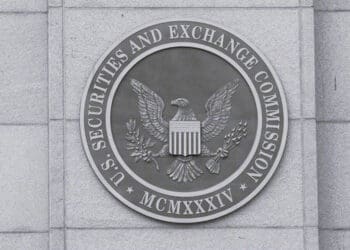With the SEC poised to take action on ESG compliance, companies are at an impasse: There’s no clear direction on ESG reporting and no agreement about what ESG compliance even means. Answers to the myriad questions around ESG reporting remain elusive.
Standardized — possibly mandated — ESG reporting is likely imminent in the U.S. And while some envision a silver bullet that will protect investors, hold companies accountable and benefit the environment (or society!) at large, regulators and compliance pros prepare to untangle a Gordian knot.
“It’s hard to get your arms around ESG,” said Seyfarth Partner and ESG advisor Giovanna Ferrari. “It’s kind of like shaping smoke. Currently, there’s not a real roadmap for what companies should do.”
While ESG compliance programs remain largely rudderless, ESG assets continue to proliferate. Though still not considered an asset class, they netted $51.1 billion in 2020 and are projected to grow above $50 trillion by 2025, representing one-third of the world’s assets under management. Wall Street profits handsomely from above-average management fees associated with ESG funds, leading some to suspect asset managers of “greenwashing” their products (that is, conveying misleading information about how environmentally sound the products are).
The U.S. Securities and Exchange Commission is now signaling action, but reactions are mixed. Compliance teams may welcome clear direction but are predictably wary of a check-the-box or one-size-fits-all approach. Asset managers (and some shareholders) say the process is politicized and lies outside the scope of the SEC. Meanwhile, a growing faction of impact investors and vote-with-your-wallet consumers view a move toward standardized reporting as a way to realign corporate America with a vision for a more sustainable, values-driven economy.
Much of this debate boils down to the question: is ESG about value or values? And that can be difficult to answer.
“If investors are buying a product that claims to use an ESG strategy or be sustainable, they should have a clear understanding of what that product actually does,” said SEC Commissioner Elad Roisman. “Asset managers selling the product should provide enough disclosure so that people can come to that understanding.”
Is ESG about value or values?
The SEC Signals Enhanced Oversight and Action on ESG
The commission has made clear its commitment to ESG matters in the near term. Since the inauguration of President Joe Biden and under the leadership of Acting Chair Allison Herren Lee, the SEC has created an enforcement task force, appointed a senior policy advisor, added a page to its website and sought public comment — all regarding its oversight on ESG-related matters.
And in December of last year, the SEC’s Asset Management Advisory Committee (AMAC) submitted potential ESG recommendations. Among other things, the committee sought to determine whether ESG investment products are fundamentally different from assets. It concluded they are not. The AMAC did, however, recommend the SEC establish standards to disclose both ESG risk and details of ESG investment products.
Karen Alonardo, Vice President of ESG Solutions at NAVEX Global, says she welcomes the action for its potential to create an ongoing, quarter-to-quarter ESG culture. Alonardo developed CSRWare (acquired by NAVEX Global last year), a software product that tracks ESG compliance.
“I’ve been waiting for the Sarbanes-Oxley for sustainability and ESG since 2008,” Alonardo said. “I don’t want this to be considered a sustainability report that captures a snapshot in time. That’s not enough. We need to make this a living, breathing practice that happens day to day within these organizations.”
The EU already has passed and implemented similar legislation. Asset managers were tasked in March to report whether their investments were creating impact along various metrics, in addition to other opt-in measures. The regulation initially required 47 metrics, but a successful lobbying effort spearheaded by the European Fund and Asset Management Association reduced the mandate to the current 18 metrics. It remains unclear whether and to what extent the U.S. will follow suit.
Lack of Transparency and the Risk of Greenwashing
There currently is no process by which the U.S. government verifies that an ESG investment product is actually ESG compliant. Nor is there even an agreed-upon definition of “ESG compliance.” The absence of oversight drives a perception of untrustworthy asset managers who might massage or greenwash the actual ESG strength of their products, though some do indeed conduct rigorous ESG testing and reporting themselves. Others license data from ESG indexes, such as those compiled by S&P or MSCI.
“One challenge is that a lot of ESG products that asset managers offer are based on third-party ESG indices or ESG ratings,” said Commissioner Roisman. “But those third-party businesses are generally not regulated, and it’s not clear to me that investors know much about their approach to ESG, let alone any material conflicts of interest they may have in designing the indices or rating systems. I think asset managers could be more transparent about this to investors.”
The issue of ESG asset performance is perhaps of greater concern. Many ESG funds that perform well do so because fund managers pack them with “low-hanging fruit.” ESG funds tend to rely heavily on technology, for example, a sector that happens to have a relatively small carbon footprint and that happens to have performed well over the past decade for reasons unrelated to ESG. As the astute investor would note, correlation between ESG and strong performance in the tech sector does not equal causation.
There also is the concern that overreliance on technology could be setting ESG funds up for a fall. In November of last year, Barron’s warned that ESG portfolios may be overexposed in technology.
Will standardized reporting protect investors from making bad investments? No. Will it create transparency that could help guide socially responsible investors? Maybe, though asset managers will likely continue to favor assets with natural ESG strength over those that reflect a company’s ongoing mission to align operations with ESG goals – which may or may not be profitable. It always will be incumbent on individual investors to parse all available information.
Standardized Disclosures Will Not Bring Forth Any New Material Risks
As for whether standardized or mandated ESG reporting will hold companies to a higher degree of accountability, the answer may be more nuanced.
Impact investors Michael O’Leary and Warren Valdmanis write in Vox, “we think what’s too often missing from the conversation is that to make corporations sustainable, we must first make them accountable … [T]his requires two things. First, accountability requires mandatory, standardized social and environmental metrics, built off the template of our mandatory, standardized financial reporting system.” O’Leary and Valdmanis go into greater length on these views in their recent book, “Accountable: The Rise of Citizen Capitalism” (Harper Collins, 2020).)
But others insist mandatory or standardized reporting won’t reveal any material information that companies aren’t already required to disclose (though they may find they must dig a little deeper in order to do so: third parties or the supply chain, for example).
Principles-based reporting requires companies to disclose risk whenever it applies. Commissioner Roisman is clear on this point.
“There are existing rules that require companies to disclose material information, whether it’s ESG-related or not,” Roisman said. “More and more, companies that have operations on coastal areas, for example, are raising concerns about storms becoming more frequent and more intense. I have not seen any enforcement actions indicating that companies are failing to disclose material risks related to climate change or other ESG areas. Again, if the information is material, a company already must report it.”
Some ESG experts pointed to the energy sector as a leader in expanding ESG reporting. “The folks in oil and gas and energy are actually further along in the ESG, because their investors have been demanding it for decades,” Giovanna Ferrari said. “I don’t think that they are going to have as big of a challenge as potentially other industries that haven’t been looking, for instance, at the sustainability within their supply chain.”
To presume that greater accountability will automatically result from standardized or mandatory reporting is to assume that companies currently and routinely misrepresent their ESG strength. Karen Alonardo rejects this notion. She thinks companies today are well aware of the reputational risk of greenwashing.
“Look at Intel a few years back,” Alonardo said. “They said, ‘We’re conflict free.’ They got their butts kicked.” In 2014, the microprocessing chip manufacturer announced at CES that all of the chips it produced going forward would be conflict-free. Subsequent investigations into Intel’s oversight found significant evidence of fraud and gaps in reporting.
The Question of Politicization
The SEC is a nonpartisan entity. Its mandate is to protect investors, facilitate capital formation and maintain fair, orderly and efficient markets. No more than three of the commission’s five members can belong to the same party, but the balance inevitably shifts with each new administration. Amy Rojik, Director of BDO’s Center for Corporate Governance and Financial Reporting, highlights that its clear the commission is moving in a new direction.
“Under President Biden, climate change is a very real political issue,” Rojik said. “We have rejoined the Paris Climate Accord. All the signals are there.”
Some believe that these moves lie outside of its scope.
The Wall Street Journal detailed this view in a recent editorial, “The Securities and Politics Commission,” stating Democrats plan to “use even the SEC as a cudgel to impose their political and cultural agenda on corporate America.”
The politicization argument returns us to one of the central questions in the debate over ESG standardization: is it about value or values?
As Commissioner Roisman, a Republican appointee, puts it, “I don’t think that an investor has to separate value from values. And that’s not for the SEC to decide. The question for us is: What should the agency try to push through our disclosure system? It has been designed to elicit information that a reasonable investor would need to make investment decisions. Every reasonable investor cares about financial value. Investors’ values, apart from this, can differ.”
Meanwhile, Karen Alonardo says she ignores politics altogether.
“We had eight years of the Obama administration, right?” she said. “Left, liberal, we were all focused on climate, everything was great. But we didn’t get regulations. So then you get the Trump era. I was like, ‘Oh god, we’re never going to move forward.’ Well, companies were still moving forward. So whether our government is Democrat, Republican or a Martian, it doesn’t really matter anymore. Companies recognize that risk is too important to an organization.”
Update: SEC’s Examinations Division Issues Risk Alert on Review of ESG Investing



 Henry Kronk is the former Managing Editor of Corporate Compliance Insights. His previous reporting has appeared in Exclaim!, the Burlington Free Press, International DJ, eLearning Inside and more. He produced the radio show Code Burst — an investigation into a coding bootcamp that sought to retrain out-of-work coal miners for jobs in tech — for CKUT 90.3 FM in Montreal.
Henry Kronk is the former Managing Editor of Corporate Compliance Insights. His previous reporting has appeared in Exclaim!, the Burlington Free Press, International DJ, eLearning Inside and more. He produced the radio show Code Burst — an investigation into a coding bootcamp that sought to retrain out-of-work coal miners for jobs in tech — for CKUT 90.3 FM in Montreal.









